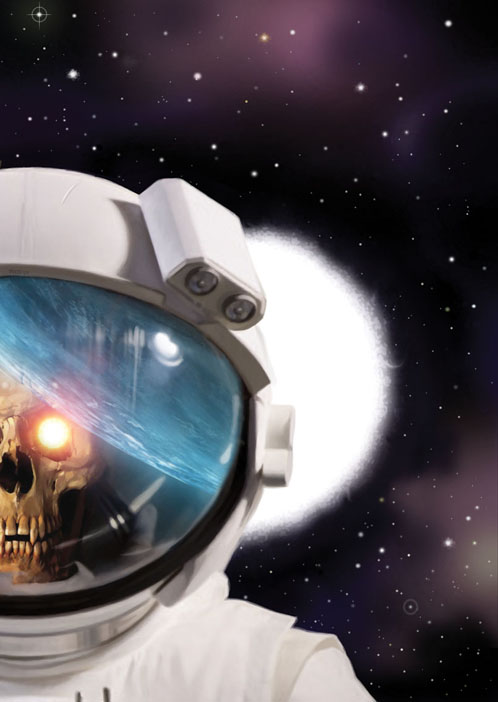
art by Tihomir Tikulin-Tico
Too Careful
by Seth DeHaan
Tom wakes in a rush of fear--as every morning--and motion triggers react to the flicker of his eyelids, flooding his small room with light. He takes immediate inventory of the space:
The door, closed; the tripwire, undisturbed.
He lifts himself from the bed in one smooth, silent motion, ears strained to catch any muffled sounds from the other room. Nothing speaks, squeaks, or sighs, so he carefully detaches the wire from the doorframe and slinks into the apartment proper.
His fingers dust each windowsill for bugs--a lesson learned in Portland--and he squats to grope beneath the refrigerator for any hidden devices--flashbacks to Rio de Janeiro. A ten-minute search, marked by a familiar dread anticipation, results in nothing. This safe house still warrants the name.
Still, Tom showers without a curtain so as to keep one eye on the door, and he takes coffee and a cold biscuit with his back to the corner. His morning routine is precise, not like that of a man half-asleep, but every movement tense with the expectation of things gone wrong.
It is Tuesday of the fourth week of the month, so his last box of cereal is empty and the few remaining coffee grounds reveal the metal of the tin beneath. Today he will go to the store, dressed in gray, sidearm tucked against his chest and knives cold against his ankles. Tom is halfway through a year in hiding--after his failure, a necessary attempt to force himself back under the radar--and hopes fervently for no setbacks.
He is aware this depends entirely on his caution, and the vigilance digs lines across his brow.
The route he plotted meticulously, after months of research to ensure minimum exposure to both pedestrian and vehicular traffic. At five after nine he leaves the apartment, and he passes Kyle on the staircase. They spoke once--a means of introduction--when Tom moved in, and have since exchanged nothing but nods of greeting. Kyle came back from Afghanistan with a pronounced limp in his left leg. He has brown eyes, a cluster of burst capillaries along his nose, a penchant for t-shirts and sweatpants, and an aggressive lack of interest in anything beside his government stipend for medicinal marijuana.
As a former profiler for the FBI, Tom was trained to detect and document minute changes in a person's behavior--gait, stance, inflection. Now, those skills are a means of survival.
His apartment is three blocks from the Quick-Mart--past abandoned storefronts and a stubborn Chinese buffet--and he's timed his trip to avoid the majority of morning commuters. People inside cars are more difficult to examine, and the unknown is always a threat, recites the mantra in his head.
Everyone in the collective memorized the mantra as part of the initiation. It is unbending, unmerciful, and it is more prayer now than recitation.
The store is deserted but for a few mothers and their children. Tom recognizes them--it is a small town--and dismisses them after cursory examinations. Children can always tell, and these show no signs of distress.
A month's groceries take him only five minutes to gather: coffee, canned vegetables--carrots--and fruit--pears--and the kind of cheap, chalky breakfast pastries you can grow to love, but not without a nagging sense of self-sabotage.
Tom pays with twenty-dollar bills. He used a credit card once in San Antonio, and can't have anything else like that on his conscience. The cashier's name is Deb and they've spoken twice before, each time in the same roles. She ends her sentences on high notes, as if even his total bill is in question, and has trouble maintaining eye contact. He returns her casual conversation with short answers and a shy smile he hopes will deflect any pursuit.
The bags are heavy and the plastic handles dig into his palms, but he walks quickly. He takes the steps two at a time, coffee can thumping against his knee, and shifts the groceries to one hand so he can take out his key. And then he reaches the third floor and his world narrows to a point.
Kyle is here, and Kyle is walking toward him with his hand raised--in greeting? Kyle nods, does not wave, as a means of acknowledgment. This is against form. Tom tenses and the adrenaline stretches his perception taut.
He drops his eyes to the man's gait. Kyle has always overpronated with his right foot to compensate for the limp, but there's a difference today. Subtle, but the roll from the heel strike is less pronounced--isn't it?--and the limp itself drags further back with each step--almost as if forced? For a moment, Tom is frozen with the key in the door, groceries idly twisting at his side. He flashes back to his failures and the consequences and the steps he'll be forced to take if Kyle is, in fact, just Kyle.
His paralysis breaks when Kyle says, "Hey man, I need to talk to you about something." Tom's heard his conversations through the thin walls. The sentence structure is all wrong, he thinks, and feels the sudden swell of relieved validation. The unknown is always a threat. In seconds, coffee grounds are strewn across the faded carpet and the knife from his right ankle has drawn a hard line across Kyle's throat. He lowers the body carefully, quietly, and waits for the reversion.
And waits.



